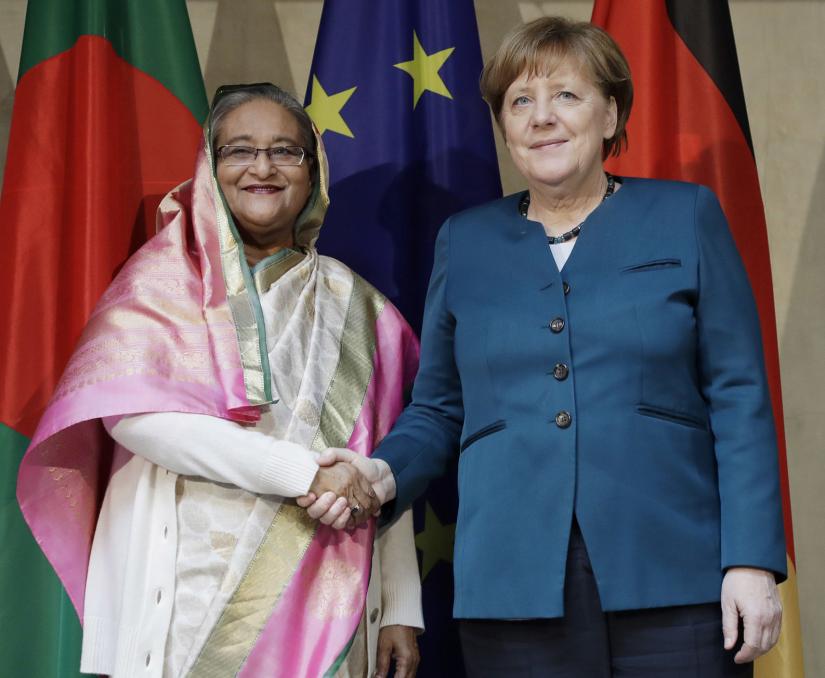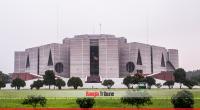 Prime Minister Sheikh Hasina plans to hit two birds with one stone during her Germany visit to attend the Munich Security Conference (MSC) this week.
Prime Minister Sheikh Hasina plans to hit two birds with one stone during her Germany visit to attend the Munich Security Conference (MSC) this week.
On the one hand, she will have an opportunity to pitch the security aspects of Bangladesh and South Asia in the backdrop of Rohingya crisis and on the other hand have the chance to cement ties with Germany and its Chancellor Angela Merkel.
An added bonus will be meeting about 30 heads of state and government who will be attending the conference.
“After many considerations, the prime minister has chosen MSC as her first foreign visit after being elected for a third consecutive term,” said a foreign ministry official.
It’s a global platform where many top political leaders will be in attendance and it’s a good opportunity for her to interact with them and portray Bangladesh as a humane and responsible state, he said.
Many developed Western countries cannot even begin to imagine what Bangladesh did by offering shelter to the Rohingyas, he added.
Another official said, in the bilateral front, Hasina will be meeting Merkel when they are likely to discuss the future cooperation in the field of Rohingya, trade, investment, climate change and other issues.
POLITICAL ENGAGEMENT
Hasina visited Germany to attend the same conference two years back and this time Bangladesh wants a reciprocal visit.
“Last time Merkel said she would visit Bangladesh but due to her domestic compulsion that was not possible,” said another official.
Europe will be the centrepiece of Bangladesh’s foreign policy where Germany is the biggest economy and the most influential member, he said.
“This time we expect she will visit Bangladesh and express solidarity with us for what we did for the Rohingyas.”
ROHINGYA CRISIS
Like Bangladesh, Germany is also a champion of accepting refugees as it has given shelter to millions of Syrians and other homeless people.
“We are not as big of an economy as Germany and it’s not possible for us to bear the burden of Rohingyas for long,” said an official.
Merkel is an important voice in the international arena and if she makes a statement at Rohingya camp expressing solidarity with them, it would amplify many times and help to resolve the crisis, he said.
INVESTMENT
German multinational Siemens has already declared to invest in power generation, transmission and distribution in Bangladesh.
“The total investment size is about seven to eight billion dollars and they want to set up 3,600-megawatt power plant and build infrastructure for transmission and distribution,” said an official.
Dhaka wants a breakthrough during the trip and if everything goes well, to sign an instrument in this regard, he added.
TRADE
Germany is the biggest export destination of Bangladeshi products and Dhaka wants to continue the duty-free market access under GSP to the European powerhouse.
“Bangladesh has graduated to a middle-income country and now we have to negotiate with the European Union to get GSP+ facility for unhindered market access to the bloc where Germany is a member,” said another official.
Here, labour issue is a big concern of the EU and Bangladesh is gradually addressing it, he added.
 National
National
41248 hour(s) 37 minute(s) ago ;
Morning 11:31 ; Tuesday ; Jul 01, 2025
PM’s Germany visit: Rohingya, economic ties top agendas
Send
Sheikh Shahariar Zaman
Published : 07:30, Feb 13, 2019 | Updated : 22:48, Feb 13, 2019
Published : 07:30, Feb 13, 2019 | Updated : 22:48, Feb 13, 2019
0 ...0 ...
/zmi/
Topics: Top StoriesExclusive
- KOICA donates medical supplies to BSMMU
- 5 more flights to take back British nationals to London
- Covid19: Rajarbagh, Mohammadpur worst affected
- Momen joins UN solidarity song over COVID-19 combat
- Covid-19: OIC to hold special meeting
- WFP begins food distribution in Cox’s Bazar
- WFP begins food distribution in Cox’s Bazar
- 290 return home to Australia
- Third charter flight for US citizens to return home
- Dhaka proposes to postpone D8 Summit
Unauthorized use of news, image, information, etc published by Bangla Tribune is punishable by copyright law. Appropriate legal steps will be taken by the management against any person or body that infringes those laws.
Bangla Tribune is one of the most revered online newspapers in Bangladesh, due to its reputation of neutral coverage and incisive analysis.
F R Tower, 8/C Panthapath, Shukrabad, Dhaka-1207 | Phone: 58151324; 58151326, Fax: 58151329 | Mob: 01730794527, 01730794528


